
The beginning of June often signals the start of mosquito season in Iowa. Photo courtesy of the ISU Medical Entomology Laboratory. Larger image.
AMES, Iowa – Mosquitoes are taking flight across Iowa, and it’s likely only a matter of time before they appear in a backyard near you.
The impending mosquito season has already begun for medical entomologists at Iowa State University, who will continue longstanding efforts to monitor West Nile Virus and expand surveillance of mosquito species with the potential to carry Zika virus.
Brendan Dunphy, a research associate in Iowa State’s Medical Entomology Laboratory, said Zika virus poses only a slight risk to Iowans because the species known to transmit the disease are not believed to have established themselves in the state.
Zika virus is an infectious disease that can lead to severe birth defects. It has threatened populations in South America, and international travel has led to some cases appearing in the United States. No cases of the disease have occurred in the United States via transmission from mosquitoes.
“To this point, there’s been an absence of established populations of the species that carry Zika in the state of Iowa,” Dunphy said. “Those species are primarily adapted for a tropical or sub-tropical climate.”
The species in question are Aedes albopictus and Aedes aegypti – exceedingly rare or yet undetected in Iowa. Dunphy said Iowa State’s mosquito surveillance efforts have turned up only 12 specimens of Aedes albopictus in the state over the last 16 years. By comparison, more common “pest” mosquitoes, such as Aedes vexans, may tally more than 100,000 specimens in Iowa in a single year.
This year, the laboratory will expand its trapping efforts to determine if Aedes albopictus or Aedes aegypti have established themselves in Iowa to gauge the potential threat posed by Zika virus, should mosquito-borne transmission occur in the United States.
Several locations in Iowa are “under-trapped and under-studied as far as mosquito populations," so lab personnel want to fill in some of those gaps in the data, Dunphy said.
“It’s not that we expect to find big populations of Aedes albopictus or or Aedes aegypti, but we want to dispel some of that uncertainty,” he said.
The Medical Entomology Laboratory has cataloged mosquito populations collected across the state every year for the last 45 years, and the lab will increase its use of traps this summer designed to lure the species that have the potential to transmit Zika, Dunphy said. The conventional traps the lab has used to catch species that may harbor West Nile Virus use a combination of light and still water to entice mosquitoes. But the new traps will simulate the secretion of human sweat and air movement patterns that mimic human respiration to more effectively lure the species with the potential to carry Zika virus.
Ryan Smith, an assistant professor of entomology at Iowa State who leads the surveillance efforts, empahsized that expanded mosquito surveillance doesn’t mean Zika virus poses a threat in Iowa.
“Currently, there is no immediate threat of Zika virus transmission in Iowa,” Smith said. “All cases of Zika in Iowa and the United States have been introduced from travel abroad, with the virus yet unable to establish local mosquito-borne transmission in the U.S. at this time. A more immediate risk for those in Iowa is the continued potential of West Nile transmission.”
Dunphy said the short lifecycle of mosquitoes means populations can spike in a hurry. The beginning of June often brings the high temperatures and rainfall that create optimal habitat for some species to lay eggs. For those species, it takes only about a week and a half after for the recently hatched larvae to develop into bloodthirsty adults.
Dunphy recommended that Iowans who want to avoid mosquitoes rid their property of all standing water to cut down on the available habitat. He said flower pots, gutters and bird baths all have the potential to attract mosquitoes. Mosquito repellents provide some protection, as does staying indoors around dusk, when mosquito activity is often the heaviest, he said.
Contacts
Brendan Dunphy, Medical Entomology Laboratory, 515-294-4387, bmdunphy@iastate.edu
Ryan Smith, Entomology, 515-294-8828, smithr@iastate.edu
Fred Love, News Service, 515-294-0704, fredlove@iastate.edu
Quick look
Mosquitoes are taking flight across Iowa, and it’s likely only a matter of time before they appear in a backyard near you. Though Zika virus poses no immediate threat in Iowa, ISU personnel are monitoring state mosquito populations for species that could potentially carry the disease.
Quote
“Currently, there is no immediate threat of Zika virus transmission in Iowa. All cases of Zika in Iowa and the United States have been introduced from travel abroad, with the virus yet unable to establish local mosquito-borne transmission in the U.S. at this time. A more immediate risk for those in Iowa is the continued potential of West Nile transmission.”
Ryan Smith, assistant professor of entomology